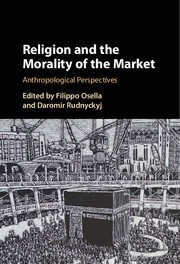Book contents
- Frontmatter
- Dedication
- Contents
- List of Figures
- List of Contributors
- Acknowledgments
- Introduction: Assembling Market and Religious Moralities
- 1 Risk, Fate, Fortune: The Lives and Times of Customs Inspectors in Southern China
- 2 Morality, Markets, and the Gospel of Prosperity
- 3 Religious Myths Retold: Masters and Servants in India's Corporate Culture
- 4 Divine Markets: Ethnographic Notes on Postnationalism and Moral Consumption in India
- 5 Merit Economies in Neoliberal Times: Halal Troubles in Contemporary Sri Lanka
- 6 “Structural Adjustment Islam” and the Religious Economy in Neoliberal Mali
- 7 Assembling Islam and Liberalism: Market Freedom and the Moral Project of Islamic Finance
- 8 Persistent Forms: Catholic Charity Homes and the Limits of Neoliberal Morality
- 9 Marketizing Piety through Charitable Work: Islamic Charities and the Islamization of Middle- Class Families in Indonesia
- 10 “A Poor Muslim Cannot Be a Good Muslim”: Islam, Charitable Giving, and Market Logic in Sri Lanka
- 11 “For God and the Country”: Agricultural Migrations and their Moralities in South India
- 12 “The Globalization of Indifference”: On Pope Francis, Migration and Global Acedia
- Index
- References
7 - Assembling Islam and Liberalism: Market Freedom and the Moral Project of Islamic Finance
Published online by Cambridge University Press: 13 April 2017
- Frontmatter
- Dedication
- Contents
- List of Figures
- List of Contributors
- Acknowledgments
- Introduction: Assembling Market and Religious Moralities
- 1 Risk, Fate, Fortune: The Lives and Times of Customs Inspectors in Southern China
- 2 Morality, Markets, and the Gospel of Prosperity
- 3 Religious Myths Retold: Masters and Servants in India's Corporate Culture
- 4 Divine Markets: Ethnographic Notes on Postnationalism and Moral Consumption in India
- 5 Merit Economies in Neoliberal Times: Halal Troubles in Contemporary Sri Lanka
- 6 “Structural Adjustment Islam” and the Religious Economy in Neoliberal Mali
- 7 Assembling Islam and Liberalism: Market Freedom and the Moral Project of Islamic Finance
- 8 Persistent Forms: Catholic Charity Homes and the Limits of Neoliberal Morality
- 9 Marketizing Piety through Charitable Work: Islamic Charities and the Islamization of Middle- Class Families in Indonesia
- 10 “A Poor Muslim Cannot Be a Good Muslim”: Islam, Charitable Giving, and Market Logic in Sri Lanka
- 11 “For God and the Country”: Agricultural Migrations and their Moralities in South India
- 12 “The Globalization of Indifference”: On Pope Francis, Migration and Global Acedia
- Index
- References
Summary
On March 1, 2010, the Wall Street Journal published an article titled “Doing God's Work,” which highlighted the impressive growth of Islamic banking and finance and some of the challenges that faced the industry as it expanded at unprecedented rates. Before presenting data on the proliferation of Islamic bonds and an array of statistical indicators for the achievements of Islamic finance at large, the article opened with a suggestive vignette that highlighted some of the moral questions raised by Islamic finance:
At a party in Karachi a young man cradles a glass of whiskey and laughs when asked why he is in the Islamic banking industry. “It is the fastest-growing sector in Pakistan,” he says. “I want to make money, so this is where I need to be. Who cares about religion?” A corporate-finance lawyer, who is a devout Muslim, gives a very different answer: “If you do not believe that Islam and its teachings can bring about positive change to the world, then you should not be in the business.” (Phillips 2010)
The contrasting vignettes presented starkly different moral orientations toward managing Islamic money. On one hand, an Islamic banker is violating one of Islam's central prohibitions and attributing his motivation to market forces; on the other is an industry player who saw Islamic finance as a moral project capable of social change. The central question that these contrasting vignettes raised was, How Islamic is Islamic finance? In other words, to what extent can Islamic finance, as a project simultaneously dedicated toward enacting Islamic values and facilitating capitalist economic action, successfully fulfill both mandates?
Indeed this is a central question that animates many of those engaged in Islamic finance today and is a recurring problem for most practitioners. This problem was evident several weeks later when I attended a public forum at the ultramodern headquarters of Malaysia's Securities Commission in the Bukit Kiara section of Kuala Lumpur. The meeting, jointly organized with the Oxford Centre for Islamic Studies, was titled “The Contribution of Islamic Finance, Post-Global Financial Crisis” and was headlined by a number of famous scholars and practitioners with international reputations in Islamic finance.
- Type
- Chapter
- Information
- Religion and the Morality of the Market , pp. 160 - 176Publisher: Cambridge University PressPrint publication year: 2017
References
- 3
- Cited by



